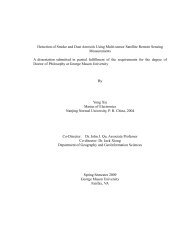Sample A: Cover Page of Thesis, Project, or Dissertation Proposal
Sample A: Cover Page of Thesis, Project, or Dissertation Proposal
Sample A: Cover Page of Thesis, Project, or Dissertation Proposal
You also want an ePaper? Increase the reach of your titles
YUMPU automatically turns print PDFs into web optimized ePapers that Google loves.
Appendix L<br />
Emotion Coaching Families<br />
The Meta-Emotion Interview<br />
Gottman, Katz, and Hooven (1997) developed the Meta-Emotion Interview and<br />
administered it to mothers and fathers. The interview includes questions about four maj<strong>or</strong><br />
components:<br />
1. Parent‘s and child‘s sadness<br />
2. Parent‘s and child‘s anger<br />
3. Hard and easy emotions f<strong>or</strong> parent<br />
4. Parent‘s perceptions <strong>of</strong> child‘s emotion regulation abilities and problems<br />
Based on their interviews with parents, they characterized three groups:<br />
Awareness <strong>of</strong> one’s own emotion is being able to talk about the emotion in a differentiated<br />
manner (differentiating various types and intensities <strong>of</strong> the emotion), particularly that the subject<br />
experiences this emotion, has no problem distinguishing this emotion from others, answers<br />
questions easily, without hesitation <strong>or</strong> confusion, talks at length about the emotion, and shows<br />
interest and excitement about this emotion.<br />
Awareness <strong>of</strong> the child’s emotion is noticing when the child has the emotion, having no problem<br />
distinguishing this emotion from others, being descriptive <strong>of</strong> the child‘s emotion, having insight<br />
into the child‘s experience <strong>of</strong> the emotion, being descriptive <strong>of</strong> some part <strong>of</strong> the remediation<br />
process (e.g., what makes child feel better), knowing the cause <strong>of</strong> the child‘s emotion, being able<br />
to talk at length and easily about the child‘s experience, and being interested in the child‘s<br />
experience.<br />
Coaching the child’s emotion involves helping the child to verbally label the emotions begin felt,<br />
showing respect f<strong>or</strong> the child‘s experience <strong>of</strong> this emotion (i.e., accepting the emotion), when the<br />
child is upset, the parent talking to the child, intervening in situations that caused the emotion, at<br />
times comf<strong>or</strong>ting the child during the emotion, teaching the child appropriate rules f<strong>or</strong> expressing<br />
the emotion, educating the child about the nature <strong>of</strong> the emotion, teaching the child strategies f<strong>or</strong><br />
dealing with the emotion, and f<strong>or</strong> soothing the intense levels <strong>of</strong> the emotion.<br />
Emotion-Coaching Families<br />
Emotion-coaching parents are doing the following five things:<br />
1. The parent is aware <strong>of</strong> the child’s emotion.<br />
First, the parent is aware <strong>of</strong> the child‘s emotion. This generally means being aware <strong>of</strong> relatively<br />
lower intensity emotions. A child does not have to be weeping f<strong>or</strong> a parent to detect the signs <strong>of</strong><br />
sadness, n<strong>or</strong> be enraged f<strong>or</strong> the parent to detect the signs <strong>of</strong> anger. It appears to be imp<strong>or</strong>tant to<br />
emotion-coaching parents to connect with their children when their children are being emotional<br />
bef<strong>or</strong>e the negative emotion escalates to a high intensity.<br />
2. The parent sees the child’s emotion as an opp<strong>or</strong>tunity f<strong>or</strong> intimacy <strong>or</strong><br />
teaching.<br />
200



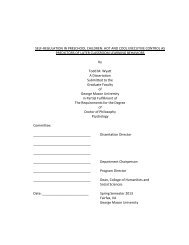
![[Sample B: Approval/Signature Sheet] - George Mason University](https://img.yumpu.com/21978828/1/190x245/sample-b-approval-signature-sheet-george-mason-university.jpg?quality=85)

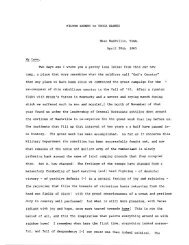
![[Sample B: Approval/Signature Sheet] - George Mason University](https://img.yumpu.com/18694905/1/190x245/sample-b-approval-signature-sheet-george-mason-university.jpg?quality=85)
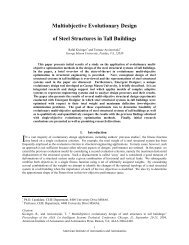

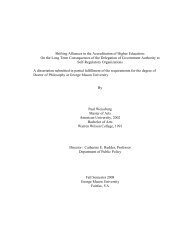
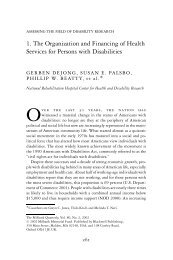
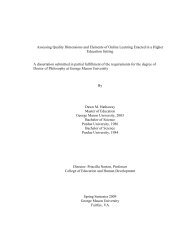
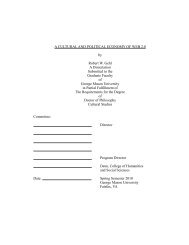
![[Sample B: Approval/Signature Sheet] - George Mason University](https://img.yumpu.com/18694552/1/189x260/sample-b-approval-signature-sheet-george-mason-university.jpg?quality=85)
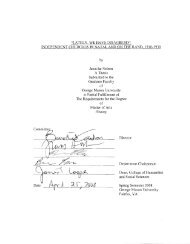
![[Sample B: Approval/Signature Sheet] - George Mason University](https://img.yumpu.com/18694474/1/190x245/sample-b-approval-signature-sheet-george-mason-university.jpg?quality=85)
